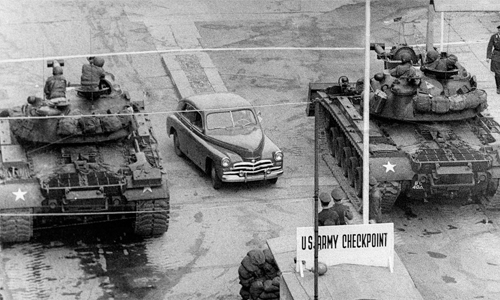Thirty years after Cold War, the fault lines are being redrawn
Right now countries across eastern Europe are preparing to celebrate the 30th anniversary of their liberation from Soviet communism. The year 1989 was one of the most momentous in world history. The West won the Cold War, but there are signs that traditional western democratic values are losing control of the peace.
I am writing from Berlin, a city full of Cold War memories. Germans are planning celebrations of the 1989 fall of the Berlin Wall, the collapse of communism, and the previously impossible dream of a reunified Germany. I recently took a walk with a friend who had never visited Berlin before, and he insisted we go to Checkpoint Charlie.
It was the most famous crossing point between West and East Berlin, the front line between two nuclear-armed powers, with two competing ideologies. My friend is part of a generation of people who grew up thinking that Checkpoint Charlie was where World War Three would break out. Any East German citizen trying to escape over the Berlin Wall to West Germany would be shot or jailed, yet superpower competition at times was almost comic.
In the 1960s, the communist east erected a massive TV Tower in Alexanderplatz, making sure it was bigger than its West Berlin rival. It is now a muchloved landmark standing over the united city. My friend and I walked down Friedrichstrasse, nowadays a wealthy shopping district, towards Checkpoint Charlie. He laughed at a couple of actors dressed in American and Russian uniforms, standing by military-looking sandbags, posing for photographs. The only obvious signs of the Berlin Wall now are shows advertised for tourists.
It is difficult to imagine that, for years, heavily armed soldiers, border police, and tanks sat on the road here. The scene now is dominated by a massive McDonald’s sign. The Soviet system created a stagnant economy and a geriatric leadership that could not compete with western entrepreneurship, innovation and consumerism. Early in 1989, there had been signs of stresses within communism.
I was a reporter for the BBC when Chinese students took over Tiannmen Square in Beijing, just as Mikhail Gorbachev, the leader of the USSR was preparing to visit China. Publicly, everything was friendly between the two countries. Privately, Chinese officials told me that Gorbachev was “mad” for embarking on his programme of perestroika and glasnost (restructuring and openness) in the USSR. They said it was possible to reform an economic system. It was also possible to reform a political system. However, no leader could do both at the same time without causing chaos.
They were right. Beijing stopped the Tiannmen Square protests, but freed up the economy and created a modern consumer-driven China. Gorbachev’s reforms were much more ambitious, but the result was, indeed, chaos, and the destruction of the Soviet Union. A string of new democracies sprang up, from the Baltic down through the Czech Republic, while East Germany integrated with the West.
The US president at the time, George HW Bush, talked of a “New world order” and a “unipolar World” with one superpower, the United States. Nato expanded to Poland and the Baltic states. The European Union took on new members in 2004. Democratic ideals had triumphed by the first years of the 21st century. Thirty years on, things are not so secure. In 2019, we have a world filled with disrupted democracies and distrusted democratic institutions. Nato has been undermined. The European Union is far from being a happy organisation.
In Britain, a survey by the Hansard Society, a non-partisan group, found that 54 per cent of those surveyed wanted a strong, rule-breaking leader, while 42 per cent thought that many problems could be dealt with if governments didn’t depend on votes in parliament. Political disrupters, such as Donald Trump, Vladimir Putin, Matteo Salvini and Nigel Farage, represent an authoritarianism that is in the ascendant. They talk tough and promise a firm hand, but the change they advocate does not represent cooperation and cohesion.
Instead, what they want is a New World Disorder. And here’s the really curious thing. In the Cold War days, many western Europeans admired Russian culture. But Vladimir Putin’s Russia has no great cultural figures: no Alexander Solzhenitsyn, Boris Pasternak or Andrey Tarkovsky. Nor does Mr Putin have a coherent world- embracing ideology. What he has is a style – that of a macho, street-fighting tough guy.
US GDP capita is $53,000 and in Germany it stands at $48,000. In Russia, it is a dismal $12,000. Since 1989, Russia has remained an economic failure. But, astonishingly, some politicians and even some voters admire Mr Putin’s strongman persona. In the case of the US president, they even admire Mr Putin himself. It is a reminder that as we celebrate the 30th anniversary of a free Europe, the dangers to democracy have not gone away. Walls can come down, but they can also be rebuilt even higher.
Related Posts

